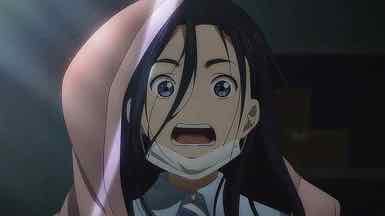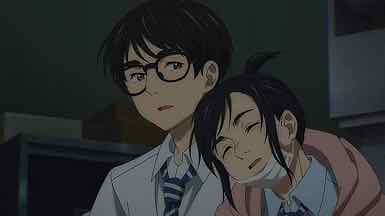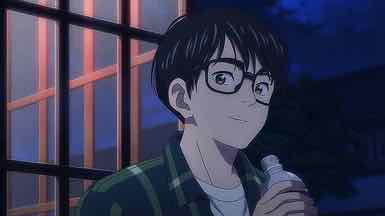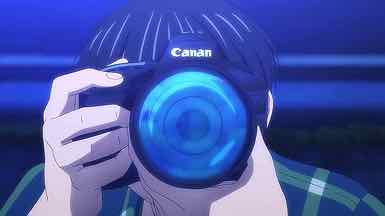 |
 |
 |
 |
 |
 |
 |
 |
 |
 |
 |
 |
 |
 |
 |
 |
 |
 |
 |
 |
 |
 |
 |
 |
 |
 |
 |
 |
 |
 |
 |
 |
 |
 |
 |
 |
 |
 |
 |
 |
 |
 |
 |
 |
 |
 |
 |
 |
 |
 |
 |
 |
 |
 |
 |
 |
 |
「能登星」 (Notoboshi)
“Capella”
A series about an insomniac boy by Lidenfilms starring Satou Gen?
Hmmm.
Insomniacs After School is the last of the really big shows on my list to premiere (though there are plenty of good prospects to come), but it’s one of the most important to me. I adore this manga, and this is another couple I love way too much for my heart. It was really a tossup between this and Tengoku Daimakyou for the second spot in my expectations, and it’s definitely another of those series that would have been #1 in a lot of seasons. Both have turned out great, but they also provide an interesting contrast in the nature of adaptation.
First off, I loved this premiere. It was terrific, but why is Tengoku Daimakyou better? I don’t know if I can say I like one manga better between them – they’re apples and oranges. But Tengoku has an adaptation that’s utterly S-class in every respect. It doesn’t have a big-name director but the staff is loaded, and when Production I.G. goes hard it’s shock and awe time. Lidenfilms has improved their production standard markedly and they’re on a tremendous run of quality series (with the Rurouni Kenshin reboot set to continue it), but their baseline is not on the same level as I.G.’s. Not a criticism, just a fact.
In’s also instructive to compare Kimi wa Houkago Insomnia against the series it inevitably will be, Yofukashi no Uta. I mean, they’re both Lidenfilms shows about a boy with insomnia sneaking out in the middle of the night for starters. And then you go and get the same seiyuu – Satou Gen – to play the boy? Given there are so many parallels already I’m not sure that was the best choice, though Satou is certainly a good actor and not miscast in either role. But in Call of the Night you had a veteran director in Itamura Tomoyuki who has a distinct and eye-catching style. Insomnia has Ikeda Yuki, a first-time director who as far as I know isn’t a big name among up and coming animators.
And that makes a difference. Yofukashi has a snap to the production, resulting mainly from Itamura’s signature touches. Insomnia is a little bit by the books, a little safe. But then, this is truly a magnificent manga so a faithful adaptation is not remotely a bad thing. It looks good, the character designs are on-point, and the tone of Ojiro Makoto’s manga is captured very well. It’s a staff full of (mostly) relative unknowns doing their best to be faithful to a great source material, and that’s exactly how it plays on-screen. It’s only when the metric is as ridiculously high as the examples I’m citing here than one might nitpick here and there.
Enough about that, let’s talk about why I love this series and this couple so damn much. It starts with relatability, which seems to grow in importance the longer I’m an anime fan. As with Call of the Night I really identify with Satou’s Nakami Ganta. I don’t suffer like he does but I have dealt with bouts of insomnia, and when he describes what it feels like it’s as if he’s ringing a bell in my soul. For Ganta the icing on the cake is that most of his classmates consider him a grouchy weirdo, and he doesn’t want them to know about his condition. An exception is his friend Ukegawa Tao (Yamashita Seiichirou), the one classmate Ganta confides in.
That loneliness of being awake in the middle of the night thinking you’re the only one in the world with this problem – if you get it, you get it. You aren’t, of course, and Ganta is about to find this out. The school has a disused observatory, the astronomy club having disbanded in the hazy past, and there are even rumors it’s haunted by the ghost of a jilted member who jumped from it to her death. It’s now a storehouse, and Ganta is sent up there to retrieve boxes for the class’ culture festival project (despite, as he points out, already having done more than his share of the work).
Ganta finds a lot more than boxes up there. Inside a locker is Magari Isaki (Tamura Konomi, basically a rookie seiyuu), sleeping peacefully. Needless to say this is a surprising moment for both of them – she panics and starts to flee before returning for her bag – but eventually Ganta corrals her to ask what’s going on. And to make matters worse (though actually better) the old door can only be opened from the outside. This forces some intimacy on the pair immediately, and soon enough they realize that they’ve found someone else with the same affliction.
Isaki has been quite industrious here. Not only did she buy a lock for the door, but she spread the ghost rumor – all so that she would have a secret place to go try and sleep a bit when her schedule allows it. This bond between them is profound by definition, but Isaki has an opposite approach to Ganta when it comes to her insomnia – she basically tries to spin it as a positive. That means she’s as popular as he is isolated, but what unites them is more powerful than what divides them. In short, they speak the same language, one those who don’t suffer from sleeplessness don’t understand – and this is another link with Call of the Night.
The final extended sequence here is very reminiscent of that series, as Isaki decides to form the “Nightly Fun Society”, since they’re going to be up anyway. And they have a wonderful adventure in town(I admit it, I’m a sucker for girls in overalls ever since “Come On Eileen”), where Ganta finds himself drawn to use the camera he brought along as an alibi in case the cops stop them. Their situation lends itself to confiding in each other, which both are clearly desperate to do. Isaki talks about her past as a frail and sickly child, and why it makes her resist sharing her current vulnerability with anyone. And of course, as the sun comes up they perform that essential adolescent mating ritual, the sharing of the QR codes.
As with Call of the Night, I think being able to identify with the protagonist is a big help in embracing the series, though not absolutely essential. Insomnia is a great romcom even if you’re not an insomniac, but like Yofakushi it really leans into the idea of finding other people who understand the way you see the world. Ultimately the most meaningful sign off the deep connection between Ganta and Isaki is that in each other’s company, they can sleep – the greatest gift they can give each other. It’s a wonderful and bittersweet story about two wonderful kids living bittersweet lives, and you won’t get many better foundations for a series than that.

Yeah, the Call of the Night vibe was very strong in that second half, I was almost expecting them to bump into Naz and Kou at any moment.
But how will it go from here? I mean, they’ve already found the solution to their problem – they just need to start sleeping together – so will it go along the lines of Tonikawa in that their relationship starts off with the endgame and needs to work backwards to fill in the gaps? Looks like I’ll be sticking around to find out.
I could answer but I’d have to destroy the website afterwards.
That would be a scary moment for Satou Gen…
Yes, I suppose meeting your doppelganger is generally reckoned to be bad news.
I feel like Isaki carried the entire episode, even though the scene was from Ganta’s viewpoint. Everything that happened felt flat, but if you’re an insomniac, wouldn’t everything feel flat since you are tired despite can’t sleep?
Isaki added a bit of energy to a very simple scenario.